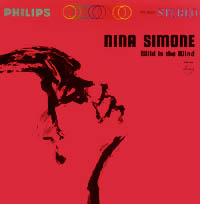Wild Is the Wind (album)
| Wild Is the Wind | ||||
|---|---|---|---|---|
 |
||||
| Studio album by Nina Simone | ||||
| Released | 1966 | |||
| Recorded | New York City, 1964 1965 | |||
| Genre |
Jazz Blues Pop Folk R&B |
|||
| Length | 39:08 | |||
| Label | Philips | |||
| Producer | Hal Mooney | |||
| Nina Simone chronology | ||||
|
||||
| Professional ratings | |
|---|---|
| Review scores | |
| Source | Rating |
| Allmusic | |
| Pitchfork | 9.5/10 |
Wild Is the Wind is jazz singer-songwriter and pianist Nina Simone's sixth album for Philips Records. The album was compiled from several recordings that were left over from sessions for previous Philips albums.
The album was a Billboard magazine "special merit pick" on release, with the reviewer commenting: "Simone ... sets up an exceptional romantic mood that offers top listening delight".
The song "Four Women" was released as a single, and gained attention when banned by the New York jazz focused radio station WLIB due to concern over the lyrics.
Simone first recorded "Black Is the Color of My True Love’s Hair" in 1955, in Philadelphia with a strings arrangement and was not intended for release at the time. (In 1970 that version appeared on the album Gifted & Black.) In April 1964 she went into a New York Studio with her band, and on the second day in the studio, she recorded the version of "Black Is the Color of My True Love’s Hair" that would appear on Wild Is The Wind. For the song, Simone only wanted a minimal accompaniment with her playing the piano and a bass drone. Lisle Atkinson [describes] what he was asked to do during his time in Nina Simone’s band: “She wanted the least amount of complication as possible—roots and 5’s, nothing too slick. I have to give Nina credit for being aware that I could bow, and she utilized it a lot. She had me playing a lot of arco in performances.”
"Wild Is The Wind" was covered by David Bowie on his 1976 studio recording Station to Station.
"Lilac Wine" was covered by Jeff Buckley on his album Grace (1994).
The album was included in Robert Dimery's 1001 Albums You Must Hear Before You Die.
...
Wikipedia
